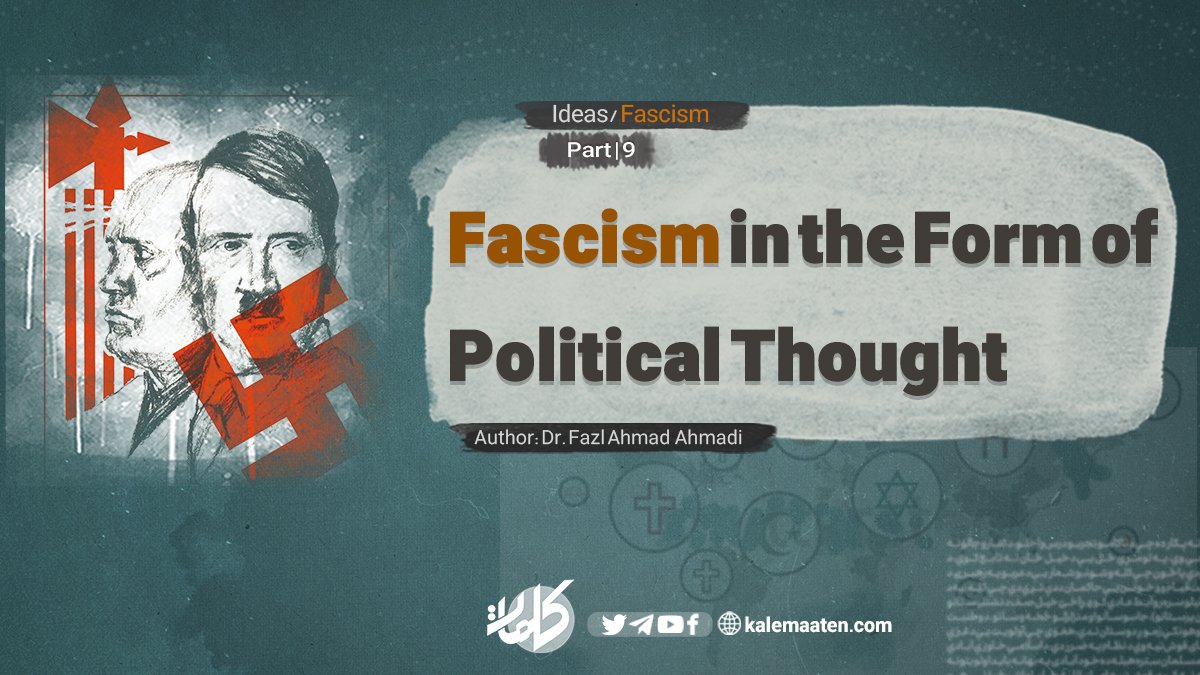Author: M. Farahi Tujegi
Fascism in the form of Political Thought (The 9th and Final Part)
The Conclusion
There is no doubt that political ideas are among the most important and controversial fields of science that have undergone significant changes throughout history. These developments have led to differences of opinion among many scholars regarding the concept of political thought, and various terms, from political philosophy to political theory, have been proposed. However, regardless of the differences in nomenclature, what is common among them is their focus on political thought as an endeavor aimed at prescribing a suitable situation for the collective life of human beings. As a result, despite the differing opinions about the components of political thought, there is one aspect they all share: the fundamental importance of the normative dimension (presenting the ideal or desirable state of the political and social system) in shaping political thought.
Meanwhile, the term “Fascism,” as a political belief and ideology first forged by Benito Mussolini to gain power and establish a specific type of state syndicalism, is not merely a political ideology alongside liberalism, conservatism, or communism. Rather, it endorses and supports a policy that served as the foundation for the emergence of a totalitarian form of government in the first half of the 20th century.
According to Mussolini, “Fascism is a reaction against the decadent doctrine of the 19th century. Fascism wants an active man who acts with all his strength, a man who confronts all the problems ahead, manly and resolute.” Fascism is “a will that makes a person superior and makes him a conscious member of the spiritual community.” Fascism is also a historical concept: “Man is nothing outside of history.” The individual only plays a role in the state, which represents the conscious and inclusive will of man in its historical existence.
Fascism, in contrast to earlier concepts, reached its peak between the years of World War I and II. However, with the end of World War II, a fatal blow was dealt to fascism, to the extent that today no right-winger likes to be called a fascist.
Finally, Fascism no longer holds the same connotations it did between the two world wars, and no group or class currently supports fascism as clearly as Mussolini did. However, the doctrine of fascism still persists and occasionally re-emerges with new colors and coverings in the rhetoric of those in power.
References and sources
Asadi and Agha Mohammadi, Majid and Dawood, (1401). “Comparative study of the military thought of socialism and fascism (from the perspective of thinkers of the two schools)”, Strategic Defense Studies Quarterly, twenty-first year, number 92, summer 1402, pages 117-138.
Bashirieh, Hossein, teaching political knowledge; Fundamentals of theoretical and institutional political science, 10th edition, Tehran-Iran, Negah Mazares Publishing House, 1392.
Blinkhorn, Martin, (undated). Fascism and rightism in Europe; 1945-1919, translated by Mehyar Aghaei, Tehran-Iran, Ni publication.
Salahi, Malek Yahya, (2019). Political thoughts of the West in the 20th century, fifth edition, Tehran-Iran, Qoms Publishing House.
Qadri, Hatem, (2019). Political ideas in the 20th century, 12th edition, Tehran-Iran, Samt Publications.
Educational Department of Political Science (2014). Textbook of political ideas in the West and Islam, third edition, Tehran-Iran.
Alam, Abdurrahman, (2008). “Theory and Practice of Fascism”, Journal of Faculty of Law and Political Science, University of Tehran, No. 71, Spring 2006, Pages 161-113.
Alavipour, Sayyed Mohsen, (2017). “From Understanding to Expressing Political Thought: Criticism of the Book of Understanding Political Theories”, Academic Books Research and Writing Quarterly, Number 43, Fall and Winter 2017, Pages 1-20.
Ghazal Salafi, Mohammad Taghi, (2013). “Aesthetics and politics with a focus on the fascism state”, State Research Quarterly, Faculty of Law and Political Science Magazine, 4th year, 13th issue, spring 2017, pages 1-29.
Mahmoudi, Sayyed Ali, (2013). Political Wisdom, Essays on Freedom, Ethics and Democracy, First Edition, Tehran-Iran, Negah Ma’azer Publishing House.
Manochehri, Abbas, (2004). “Political thought as an interdisciplinary knowledge: a symbolic-paradigmatic narrative”, Quarterly Journal of Interdisciplinary Studies in Humanities, 7th Volume, 2nd Number, Spring 2014, Pages 1-22.
Mirahmadi, Mansour, (2012). “Philosophical foundations of political ideas in Islam”, practical-research quarterly of transcendental politics, first year, first issue, summer 2013, pages 178-153.
Mir Mahmoudi, Toraj, (1400). “Nationalism among Muslim nations and the West; and the effect of nationalism on the unity of the Islamic world”, Social/Islamic Research Quarterly, Spring and Summer 1400, No. 123, pages 312-338.
Haywood, Andrew, (2011). Politics, translation: Abdul Rahman Alam, second edition, Nei Publishing House, Tehran-Iran.



